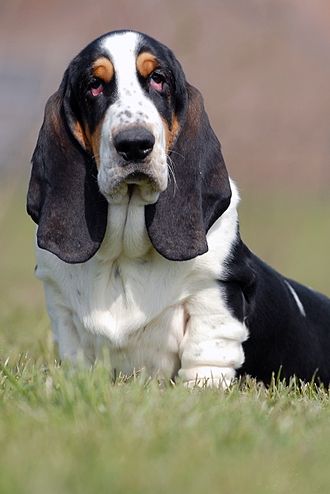Basset Hound




Basset Hound
The Basset Hound is a short-legged breed of dog of the hound family. The breed is a scent hound that was originally bred for the purpose of hunting hare. Their keen sense of smell and ability to ground-scent is second only to the Bloodhound. Basset Hounds are one of six recognized "basset"-type breeds in France. The name "basset" is derived from the French word bas, meaning 'low', with the attenuating suffix -et, together meaning 'rather low'. Basset Hounds are well-known for their large, floppy ears, mournful eyes, and distinctive baying bark. They are extremely friendly and gentle with children and other pets, making them excellent family pets.
History[edit]
The Basset Hound's origins can be traced back to France in the 16th century. It is believed that the Friars of the Abbey of St. Hubert in Belgium were instrumental in developing the breed. They wanted a dog that could follow a trail over and through difficult terrain. The dogs were bred for their ability to hunt and track hare, deer, and other game with their powerful sense of smell. The breed was then brought to England in the late 1800s, where it gained popularity among hunters.
Characteristics[edit]
Basset Hounds have a distinctive physical appearance characterized by their long, droopy ears, wrinkled skin, and short, sturdy legs. They have a dense, smooth, short coat that can come in any of the typical hound colors such as black, tan, and white. Their large skull is well-proportioned to their body, and their mournful eyes and drooping lips add to their distinctive look.
Temperament[edit]
Basset Hounds are known for their laid-back personality, patience, and friendliness. They are particularly good with children and other pets, making them excellent family dogs. However, they can be stubborn, especially when it comes to training. Their strong sense of smell can often lead them astray, especially if they catch an interesting scent.
Health[edit]
Like all breeds, Basset Hounds are prone to certain health issues. These can include ear infections, due to their long, floppy ears, and obesity, which can lead to back problems because of their short legs and long body. It is important for Basset Hound owners to regularly check their ears and maintain a healthy weight for their pet.
Care[edit]
Basset Hounds require regular exercise to manage their weight, but their exercise needs are moderate compared to other breeds. They enjoy walks and can be quite playful. Their coat needs minimal grooming, but their ears require regular cleaning to prevent infections. Training can be a challenge due to their stubbornness, but with patience and consistency, they can learn commands.
In Popular Culture[edit]
Basset Hounds have been featured in various forms of media and popular culture. Perhaps the most famous Basset Hound in popular culture is Fred, the companion to detective Columbo in the television series Columbo. They have also been used in advertising and as mascots due to their distinctive appearance and friendly nature.
Ad. Transform your life with W8MD's Budget GLP-1 injections from $75


W8MD offers a medical weight loss program to lose weight in Philadelphia. Our physician-supervised medical weight loss provides:
- Weight loss injections in NYC (generic and brand names):
- Zepbound / Mounjaro, Wegovy / Ozempic, Saxenda
- Most insurances accepted or discounted self-pay rates. We will obtain insurance prior authorizations if needed.
- Generic GLP1 weight loss injections from $75 for the starting dose.
- Also offer prescription weight loss medications including Phentermine, Qsymia, Diethylpropion, Contrave etc.
NYC weight loss doctor appointmentsNYC weight loss doctor appointments
Start your NYC weight loss journey today at our NYC medical weight loss and Philadelphia medical weight loss clinics.
- Call 718-946-5500 to lose weight in NYC or for medical weight loss in Philadelphia 215-676-2334.
- Tags:NYC medical weight loss, Philadelphia lose weight Zepbound NYC, Budget GLP1 weight loss injections, Wegovy Philadelphia, Wegovy NYC, Philadelphia medical weight loss, Brookly weight loss and Wegovy NYC
|
WikiMD's Wellness Encyclopedia |
| Let Food Be Thy Medicine Medicine Thy Food - Hippocrates |
Medical Disclaimer: WikiMD is not a substitute for professional medical advice. The information on WikiMD is provided as an information resource only, may be incorrect, outdated or misleading, and is not to be used or relied on for any diagnostic or treatment purposes. Please consult your health care provider before making any healthcare decisions or for guidance about a specific medical condition. WikiMD expressly disclaims responsibility, and shall have no liability, for any damages, loss, injury, or liability whatsoever suffered as a result of your reliance on the information contained in this site. By visiting this site you agree to the foregoing terms and conditions, which may from time to time be changed or supplemented by WikiMD. If you do not agree to the foregoing terms and conditions, you should not enter or use this site. See full disclaimer.
Credits:Most images are courtesy of Wikimedia commons, and templates, categories Wikipedia, licensed under CC BY SA or similar.
Translate this page: - East Asian
中文,
日本,
한국어,
South Asian
हिन्दी,
தமிழ்,
తెలుగు,
Urdu,
ಕನ್ನಡ,
Southeast Asian
Indonesian,
Vietnamese,
Thai,
မြန်မာဘာသာ,
বাংলা
European
español,
Deutsch,
français,
Greek,
português do Brasil,
polski,
română,
русский,
Nederlands,
norsk,
svenska,
suomi,
Italian
Middle Eastern & African
عربى,
Turkish,
Persian,
Hebrew,
Afrikaans,
isiZulu,
Kiswahili,
Other
Bulgarian,
Hungarian,
Czech,
Swedish,
മലയാളം,
मराठी,
ਪੰਜਾਬੀ,
ગુજરાતી,
Portuguese,
Ukrainian